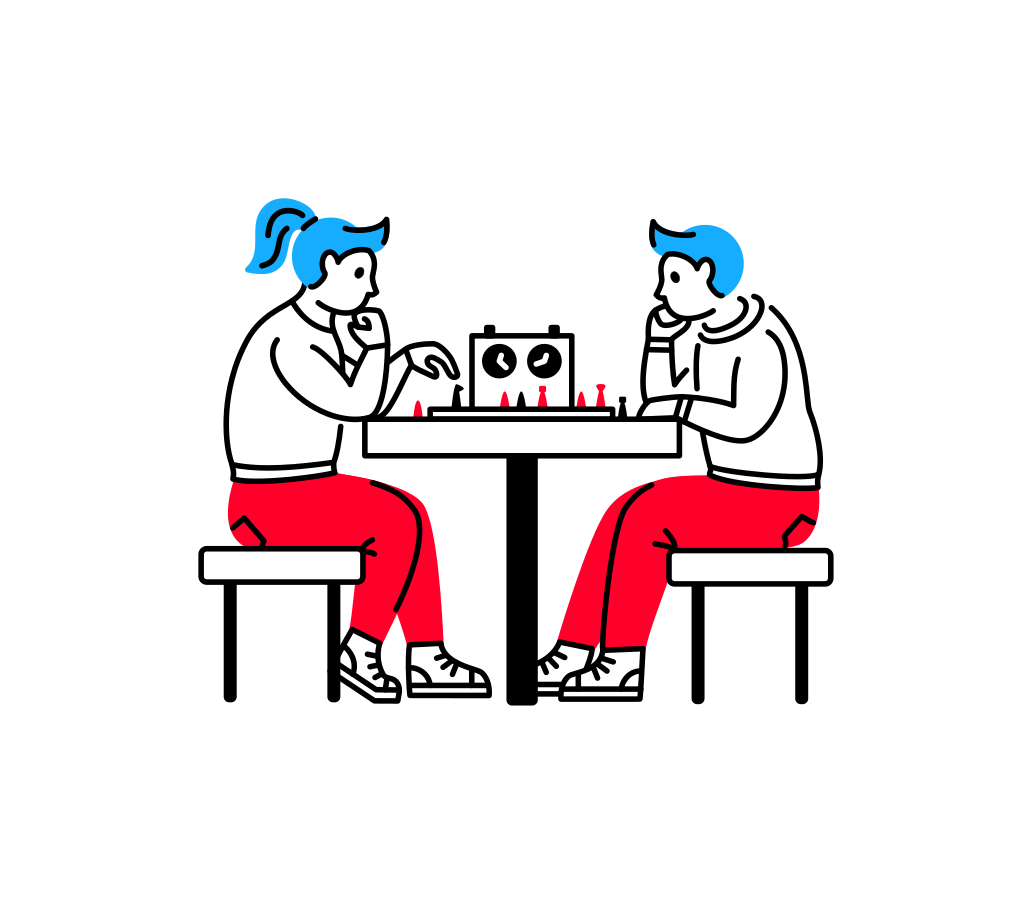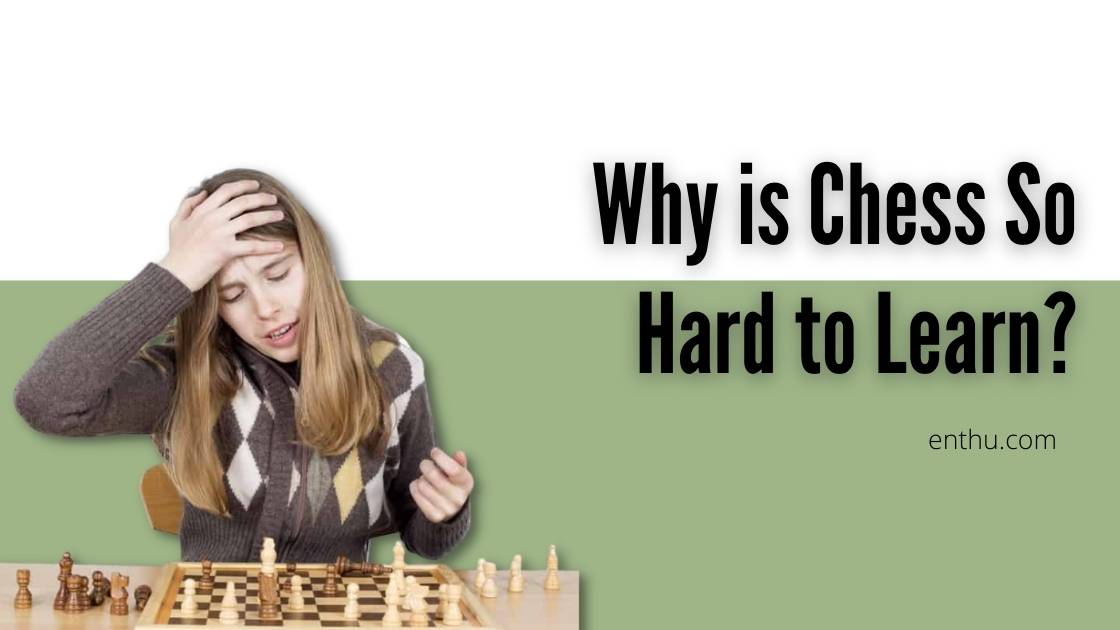Grandmaster Garry Kasparov infamously said, “Chess is mental torture.”
Countless chess enthusiasts consider him to be the greatest chess player on earth. Imagine if someone like him described the game as mental torture, then what would beginners and amateurs like you and me feel about it!
Why is chess so hard?
Well, I’m not here to scare you off. But, the chess board is a battlefield.
I bet the reasons will surprise you, as ‘SURPRISE’ is one of the main reasons for that.
Why is Chess So Hard?
Chess is a hundred-year-old board game. In the 5th century AD, the game originated in India and spread to Persia. From the inception of chess till now, the complexities have only increased.
Chess is so popular that almost everybody has tried their hands at it at least once, but very few of them take the time to learn about chess’s rules, strategies, and tricks.
It’s definitely not a cakewalk from memorizing complex opening moves to recognizing patterns and choosing the right endgame before sitting before the chessboard.
Not every board game gets called the game of kings; chess deserves it.
10 Reasons Chess is so Hard
“Many have become Chess Masters; no one has become the Master of Chess.”
1. A Lot of Chess Pieces
What makes chess different from other board games, for instance, checkers, is the wide range of chess pieces. Moreover, unlike checkers, where you have to follow one pattern only, each chess piece has its individual movement. This calls for infinite possibilities within one single game.
Each player has to start the game with 16 pieces which are very difficult to control. You have to play with 8 pawns, 2 bishops, 1 king, 1 queen, 2 knights, and 2 rooks. It’s already overwhelming, right?
2. Complex and Distinctive Movements
If you think knowing all the pieces ends the struggle, then you are wrong. Each of the 6 kinds of pieces comes with different kinds of movements.
For example, a King is allowed to move in one square in each direction. On the other hand, a Queen does not abide by a similar boundary. A Queen piece can move in any direction, to any distance in a straight line.
A big part of the game is to guess the possible next move of your opponent.
Be it castling, checkmate, or stalemate, chess opens up unique and complex movements and playing techniques, making it hard to learn.
3. Memorization of Techniques
If various movements of chess pieces don’t bother you, then I suggest you try memorizing the techniques, even the basic ones. Because it’s one thing to memorize the chess movements and techniques but another thing to implement in the game.
The experience of playing chess is similar to going into a battle. The main motive is to win, that is, to capture your opponent’s King.
In order to do this, memorizing the techniques will not be enough. You have to master your moves as well.
4. Quick Adaptation
This is where chess stands apart from all other games. You can adapt to adverse situations by practicing the game over and over again, but you can’t possibly predict the surprise movements your opponent’s going to offer you.
Unlike any other game, say soccer, practice is not the only aspect that will help you to win a match. The reason being that you can be good at soccer with extensive practice sessions. But chess demands modification at every step.
Certainly, it is not possible to predict your opponent’s next move. So, you have to be attentive and quickly adapt to the new situation to move along. This uncertainty makes chess harder than other board games and it takes a lot of dedication. You have to consistently think on your feet!
5. Time Constraints
Well, not all chess games come with time restrictions. But, many professional chess tournaments, such as Blitz or Rapid Tournaments, use timers to act upon your turn.
By embracing time restrictions, you let go of your comfort zone.
You have to predict your opponent’s next movement, secure your game, and try to checkmate simultaneously with a ticking clock by your side.
You can already feel the pressure, right?
Check out EnthuZiastic Chess Classes for a personalized Chess learning experience.
6. Exhaustive Openings
There are innumerable range of possible openings. But, at times, openings are so exhaustive at a level that they reach the middlegame.
Is it even possible to memorize at such lengths? This might be overwhelming for a beginner who is just starting to play chess.
Sometimes it might be a trap set up by your opponent to ruin your game. Therefore, remember to always learn your endgames before anything else.
7. Unsure Middlegames
Middlegames are the most confusing (at least in my opinion). Middlegames are hard because there are unending possibilities to play your pawns.
In most cases, middlegames are played on expertise and intuition. As a novice player, you need several hours of practice to develop such kind of intuition that will guide your game to a winning position.
Also, middle games are the most unpredictable, and it defines the result of the game.
8. Difficult Endgames
The number of chess pieces on the board decreases as the game proceeds? Are the few remaining chess pieces alarming enough to worry us?
The answer is yes!
Most people make the mistake of assuming that endgames are the easiest part of chess. But the subtle speed and wide scope make it hard to play the endgames properly.
If you are a beginner or an amateur player, it would be hard for you to judge the movement even if you have read about the tactics.
9. Making Mistakes Consistently
If you are learning chess without a coach, it is possible that you will make mistakes consistently. The other face of it is that it will be difficult for you to learn from your wrong moves and strategies.
Chess is such a variegated game that if you take a wrong step in your opening, you will not feel its tremors until you are almost at the end of the game. In such a situation, it is difficult to trace back your steps and pinpoint where you actually went haywire.
As a result, you keep on repeating them.
10. Posture
Chessboard is not the only thing that you have to worry about in a game. Think about your own body language as well.
Keep a poker face so that your opponent will not see the emotional turbulence you are actually going through. Because they will take advantage of it!
Find out the Number of Possible Chess Games Without the Above Rules
Read The Shannon Number to find out.
How To Make Learning Chess Easier?
“Without error, there can be no brilliancy” – Emanuel Lasker.
I hate to break it to you, but there’s no textbook way to get better at chess. As this amazing game offers you endless opportunities, your possibility of learning and improving is a constant process.
Start by understanding the rules of the game. If you get a good grasp of the rules, you will have a fair idea of your openings, middle game, endgame possibilities, and en passant.
- Even before you sit in front of the chess board, you need to learn all the rules and tricks. Even if you know the rules, it is wise to revise them from time to time.
- There is no alternative to practice. If you want to get better at chess, practice regularly. Play with your chess-enthusiast friend or else you can play on your computer.
- If you play and don’t review your games, it will lead you to a dead end. So, keep active track of your mistakes, learn from them, and ever repeat.
- Here’s a trick nobody will tell you. Focus on your endgames to win faster. It will help you with time-bound games.
- If you only focus on memorizing the moves and tactics, it won’t be of much use practically. Too much of them will make you a dull person. So, learn your tactics while implementing them in your game.
- Check out how grandmasters are playing, and learn from them.
Improvisation is a key to success when it comes to chess. And the only way to access your improvised moves is to practice.
So, whenever you get some time, sit for a game. Look closely at how your opponent is beating you, and take note of it.
Check out the amazing chess tips and tricks here.
Most beginners underestimate the power of the pawns. Read books, take online chess classes, or watch YouTube tutorials to learn new tricks and understand the game of chess better.
There are 1756 chess grandmasters in the world
Read How many Grandmasters are there to find how many are active.
Also Read
FAQs
Why is chess so hard?
Chess is hard because there are hundreds of patterns, concepts, and strategies that a player must know before playing the game. Spatial and quick reasoning skills are also extremely difficult to play in this game. One must be able to visualize several moves ahead and still accurately analyze the position of the pieces.
Can chess be learned?
Yes, chess can be learned. In fact, most great chess players have had formal chess education before playing it professionally. You can learn it from a professional chess player, a chess teacher, YouTube, or you can take up online chess courses to learn the game better.
Does chess increase IQ?
Yes, chess increases IQ. According to a study conducted in Venezuela by a group of scientists and sports researchers, 4000 middle-grade students have shown excellent improvement in IQ.
What is the best method to learn chess?
There is no better way to learn chess. It varies from person to person. There are numerous chess tutorial channels available on YouTube and other streaming platforms on the internet for free. You can take up a traditional chess class from a chess instructor. Also, you can enroll in an online chess course to learn the game from the comfort of your home.

Learn Chess From Expert Teachers
Conclusion
If I have to put it simply, there is no denying that chess is hard. In fact, it is harder than most of the board games you have come across.
But, there’s always the silver lining; if you put time and effort into it and practice regularly, then you can also get better at it.
Sure, chess is intimidating, but remember that it’s just a byproduct of the human brain. Be patient and invest time in learning, and it will be easier for you to ace the game.
EnthuZiastic offers excellent online chess courses. Learn the game from the comfort of your couch. This is one of the best ways to learn it.
Who knows, you can also become the next grandmaster! Fingers crossed till then.

